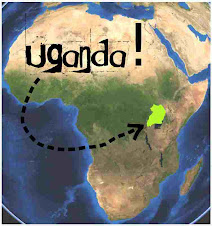A month and half ago, I was freezing my ass off.
It was a Monday morning. I was sitting outside the school office, spaced out like I usually am after teaching my 8 am physics class. An impenetrably thick layer of clouds had decided to usurp the normally fair skies of Kiziranfumbi that day, driving the temperature down to a frigid 70 degrees Fahrenheit. Goosebumps dotted my bare arms as I sat there in a rickety wooden student desk, quietly reflecting that my decision to wear a short-sleeved polo shirt to work that morning had been a mistake.
"How can you stand this cold?" my headmaster, Fred, asked.
In truth, I found it rather unpleasant. But I'm in total denial about how much of a weather wimp I've become after a year and half of living in the tropics.
"We Americans are used to it," I replied, secretly longing for my fuzzy black Mountain Hard Wear fleece.
"Well, I can't stand it," Fred said. "I'm going to the center for a cup of hot tea. Can I borrow your bicycle?"
Now normally I would deny a request like this. My bike is a secondhand mountain bike, or "sport bike," as they're called here, from Japan. Cosmetically, it's a piece of shit. A large chunk of the plastic gear guard is missing, the handlebar grips are coming apart, and the brakepads and tires probably haven't been replaced in a decade. Americans wouldn't think twice about chucking this thing in the trash on bulky waste pickup day (shoutout to my dad, who rescues still functional bikes from the trash!). But to a rural Ugandan, my bike is a coveted possession. A sport bike is several notches up from their heavy, rusted, fixed speed workhorse bikes, which—while good for hauling water from the borehole or carrying large bundles of sugarcane, goats, bedframes, or coffins—are more often than not missing crucial components, like pedals.
In the 15 months I'd worked with Fred, though, I'd come to know that he's a fairly decent, trustworthy guy. That's saying a lot for a school headmaster, a demographic that is notorious for their corruption. Ugandan headmasters typically siphon money away from their schools for private use, hire staff based on personal connections rather than merit, rule with an iron fist, and generally abuse their power in other ways—and get away with it. Fred, thankfully, shows none of these qualities, which is why I trust him more than almost anyone I work with. So naturally, when he asked to borrow my bike, I let him.
An hour later, Fred returned. My bike was intact, but the cable lock was completely busted. Fred had locked it around the handlebars in a way that prevented the rider from using the brakes, and then somehow had dislocated the key slot so that it couldn't be unlocked. Needless to say, I was a little angry about this. I'd used that same lock hundreds of times and never had any problems, yet in the one time Fred used it, he had managed to destroy the thing. But something like this was to be expected from the lock's inferior Chinese construction. Rather than make a big deal out of it, I simply asked Fred to buy me a new lock the next time he was in Hoima (they only cost like $2), to which he agreed. I then fetched a butane tank and a Bunsen burner from the lab and set about melting the old lock apart.
Some days later, I was rummaging around the cluttered lab storage room, gathering equipment to do a demonstration of heat convection for my Senior 1 physics class, when my good friend Jotherm, the lab manager, came in. We started talking and he mentioned that the headmaster had grumbled to him about having to buy me a new bike lock. Apparently, Fred was annoyed that I had asked him to pay the full cost for the new lock, as opposed to splitting the replacement cost with him 50-50.
I had stumbled a critical difference between how Americans and Ugandans assign blame and resolve conflicts. To an American, my solution to the bike lock issue was the obvious, logical one: Fred had borrowed my bike. Therefore, he had automatically assumed complete responsibility for it while it was under his control. He would be expected to pay for any damage caused to the bike or its accessories during the period he used it, simple as that. The terms of this contract were—to me, anyway—implied and trivial. They did not need to be stated; they were assumed.
Unfortunately, this is not how things are done in Uganda. Here, when a friend borrows your property, you both enter into a nonverbal agreement to temporarily share responsibility for the object. The owner can never completely relinquish responsibility, but since the owner gives up a certain amount of control over the object by lending it out, it is only natural that the borrower assumes some responsibility to account for the uncertainty he has introduced to the situation by removing the object from the owner's careful watch. Since responsibility is shared, both parties must contribute to repair or replacement costs in the case that the object is damaged while the borrower uses it. That is precisely why Fred was surprised that I asked him to pay for a new bike lock in full. In his mind, he was not solely responsible for the lock breaking.
This speaks volumes about how Ugandans view control in their lives. There is a great deal of fatalism in this country. Few people seem to feel that they are truly the masters of their own lives, and in many ways, they aren't. Uganda is an agricultural society. The welfare of its people and the health of its economy depend tremendously on rainfall patterns and crop yields. Not even the industrialized world has control over these factors, but the advantage of industrialization is that low crop yields rarely have catastrophic effects on the livelihood of the average citizen, due to the immense diversification of these economies and their employment sectors. But in Uganda, a bad growing season can prevent parents from raising the fees necessary to send their children to school, or feeding their family adequately, or keeping a sick relative alive by footing his or her hospital bills.
Moreover, anyone born into this society inherits the legacy of decades of misrule by despots who have all laughably called themselves "President," the ineffectiveness of a pseudo-democratic parliamentary republic at addressing the dire needs of its people, and the economic hardships introduced by over a century of exploitation under British colonial governance. Ugandans have the odds stacked against them; it is understandable that many feel powerless to improve their lot in life.
All of this translates into a deep, collective fatalism, the belief that one's destiny is determined entirely by uncontrollable external factors or acts of God. (As a side note, I take the admitedly cynical view that the main reason Ugandans are so religious is not that they place great value on showing reverence for God, but because they believe prayer will magically bring them meat and money and other earthly possessions that will assuage their hardships. The word "to pray" in Runyoro, kusaba, is synonymous with "to ask for." Thus, whenever you pray, you are really asking for something. I am not sure that kusaba carries the same sense of worshipping as "to pray" does in English.) Perhaps this explains why Fred expected to share responsibility for the broken bike lock: such things just happen, and to blame any one individual for a small, random act of God is unfair. It is up to all of us to collectively deal with the erratic behavior of the universe. A man alone cannot best fate.







